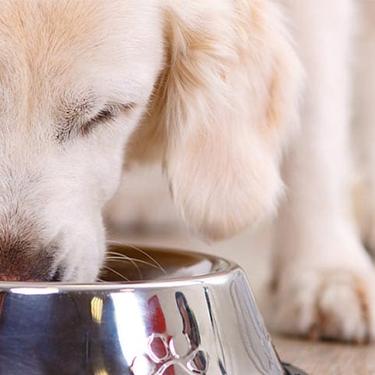
-
Find the right food for your pet
Take this quiz to see which food may be the best for your furry friend.
Find the right food for your pet
Take this quiz to see which food may be the best for your furry friend.
Featured products
 Adult Healthy Cuisine Roasted Chicken, Carrots & Spinach Stew Dog Food
Adult Healthy Cuisine Roasted Chicken, Carrots & Spinach Stew Dog FoodDelicious roasted chicken paired with tender vegetables in a succulent stew
Shop Now Adult 7+ Perfect Digestion Chicken, Whole Oats & Brown Rice Recipe Dog Food
Adult 7+ Perfect Digestion Chicken, Whole Oats & Brown Rice Recipe Dog FoodScience Diet's breakthrough nutrition supports ultimate digestive well-being & healthy microbiome for dogs age 7+
Shop Now Small & Mini Savory Stew with Chicken & Vegetables Dog Food
Small & Mini Savory Stew with Chicken & Vegetables Dog FoodA delicious complement to the nutrition of Science Diet Small & Mini 7+ dog food
Shop NowFeatured products
 Adult Savory Entrée Can Variety Pack Cat Food
Adult Savory Entrée Can Variety Pack Cat FoodPrecisely balanced nutrition with the delicious taste of savory minced chicken to help fuel the energy needs of cats during the prime of their life
Shop Now Adult 7+ Tender Tuna Dinner Cat Food
Adult 7+ Tender Tuna Dinner Cat FoodWith delicious chunks in a decadent gravy
Shop Now Adult 7+ Senior Vitality Chicken & Vegetable Stew Cat Food
Adult 7+ Senior Vitality Chicken & Vegetable Stew Cat FoodImproves Everyday Ability to Get Up & Go
Shop Now -
Dog
- Dog Tips & Articles
-
Health Category
- Weight
- Food & Environmental Sensitivities
- Urinary
- Digestive
- Joint
- Kidney
-
Life Stage
- Puppy Nutrition
- Adult Nutrition
- Senior Nutrition
Cat
- Cat Tips & Articles
-
Health Category
- Weight
- Skin & Food Sensitivities
- Urinary
- Digestive
- Kidney
-
Life Stage
- Kitten Nutrition
- Adult Nutrition
Featured articles
 Why Are Dogs and Cats So Cute?
Why Are Dogs and Cats So Cute?If waggy puppy dog tails and furry kitten yawns make you swoon, you're not alone. Why are cats so cute? And, dogs too! Let's find out!
Read More Do Dogs and Cats have Belly Buttons?
Do Dogs and Cats have Belly Buttons?Learn whether cats & dogs have belly buttons like humans, what the function is, and if there are any health concerns associated with it.
Read More Does My Pet Hate Me?
Does My Pet Hate Me?Learn tips for bonding with your pet if you've ever thought, 'My dog doesn't like me, or 'Why do I have a standoffish cat?'
Read More -


When your best friend is hurting, you want to help. And although it's easy to either take a Tylenol, chew a Tums, or pop a cough drop when you're not feeling well, it's not as easy to know how to help a dog who needs pain relief. Here's what you can do for dog in pain:
Recognizing a Dog in Distress
Some breeds will let you know that something isn't right–through actions like yipping, barking, or acting panicked in general. Most dogs handle it almost stoically, though, not letting on that they're in pain. They may be completely unable to tell you they're in distress. Luckily, there are signs a dog isn't feeling well. Subtle signs of a dog in pain include:
- A change in energy level: low energy, or, conversely, unable to sit still
- Seeming socially withdrawn
- Changes in breathing (usually panting or breathing faster and shallower than normal)
- Loss of appetite and less water intake
- Constantly grooming a specific area on themselves
- Increased heart rate
- Biting, growling, or whining when picked up
- A change in mobility (suddenly refusing to climb stairs)
Just remember the signs of an unwell pup might only be noticeable by you–the one who knows your dog best.
Talk to Your Veterinarian
Ultimately, make an appointment to see your vet if you see any of these signs of pain in your dog. Your vet can determine the underlying issue causing the discomfort. Sometimes injuries are apparent–a wound or broken bone, for instance–whereas other causes might not be so noticeable. Typical issues that cause dogs to suffer include:
- Arthritis
- Bone cancer
- Kidney stones
- Ear infections
- Pancreatitis or gastritis
- Sliding kneecap
- Gum disease


Tasty Tips
How to Alleviate the Pain
Among the most common medications your vet might recommend for your pet's pain are nonsteroidal anti-inflammatory drugs (or NSAIDs), which offer relief similar to your own Ibuprofen or Aleve. PetMD suggests these medications can help reduce pain, swelling, stiffness, and any joint discomfort he may be feeling. Some NSAIDs created specifically for dogs include carprofen, deracoxib, firocoxib, and meloxicam. Many commonly used human approved NSAIDs may be toxic to your dog, however, so don't just use your pain medication–speak to your veterinarian first. The Food and Drug Administration (FDA) has an easy way to remember the signs of worrisome side effects of NSAIDs with the acronym, "BEST":
- Behavioral changes
- Eating less
- Skin redness or scabs
- Tarry stool, diarrhea, or vomiting
Stop using the medication and call your vet immediately if you see any of these issues.
Eliminating It for Good
Although pain medications may work as a temporary fix, the ultimate goal is permanent dog pain relief. You may work toward this goal with a change in food. Your dog's pain might be alleviated by changing his food. Products that are high in omega-3s, according to Dr. Donna Solomon in the Huffington Post, can help reduce pain by alleviating joint inflammation.
You can also help ease some pain with some careful weight management. Extra pounds can cause painful health issues like pancreatitis and a sliding kneecap to worsen. If your dog needs to lose weight, try a food specially formulated to help your dog shed it in a healthy way, such as Hill's® Science Diet® Adult Perfect Weight.
Another option is physical therapy. This may also help in your dog's comfort when dealing with recovery from injury or with arthritis. Ask your veterinarian about physical therapy treatments.
What Not to Do
You might be tempted to give your dog something from your own medicine cabinet if he's in pain. Not so fast. Although dog-approved NSAIDs are similar to common over-the-counter medications you might buy for yourself, the human variety can be very dangerous to a dog. This is because the dosages needed by dogs may be very different than those of a human, or the metabolism of the drug may be different. Just one pill could exacerbate health issues and even result in death.
Never give pain medication to your pet without first consulting your veterinarian. The veterinarian most familiar with your dog's health concerns should be able to tell you the proper medicine as well as dosage to provide your dog to ensure it accurately treats his pain.
You know your canine companion best. If you feel like something is wrong with him, trust your instinct and remember signs of pain in a dog can be subtle. A call to your vet is always a safe bet.


Kara Murphy is a freelance writer and pet parent who lives in Erie, Pa. She has a goldendoodle named Maddie.
Related products
Related articles

Learn how today's wet dog food blends have gotten a face lift, and how you'll provide your dog the nutrition he needs in the form he loves.

Proper nutrition for your pregnant or nursing dog is vital to her and her puppy's health. Learn what you should do provide her with the proper nutrients.

Learn the the dangers of feeding your dog chocolate, which types are most dangerous, and what to do if you discover that they have consumed chocolate.

Learn about choosing the right dog food to help ensure your adult dog will receive the correct balance of nutrition.

Put your dog on a diet without them knowing
Our low calorie formula helps you control your dog's weight. It's packed with high-quality protein for building lean muscles, and made with purposeful ingredients for a flavorful, nutritious meal. Clinically proven antioxidants, Vitamin C+E, help promote a healthy immune system.
Put your dog on a diet without them knowing
Our low calorie formula helps you control your dog's weight. It's packed with high-quality protein for building lean muscles, and made with purposeful ingredients for a flavorful, nutritious meal. Clinically proven antioxidants, Vitamin C+E, help promote a healthy immune system.

